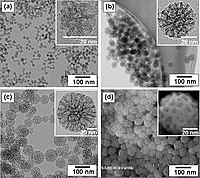
Photo from wikipedia
China’s highway asphalt pavement has entered the stage of major repair, and improving the utilization rate of recycled asphalt pavement (RAP) is the main issue. The key link affecting the… Click to show full abstract
China’s highway asphalt pavement has entered the stage of major repair, and improving the utilization rate of recycled asphalt pavement (RAP) is the main issue. The key link affecting the performance of recycled asphalt mixtures is the regeneration of aged asphalt, and the effect of the regenerant dosing on the high-temperature performance and viscosity of aged asphalt is the main content to be studied in this research. The aging behavior of asphalt seriously affects the roadworthiness of asphalt mixtures. In this study, we investigated the effect of changes in the microscopic properties of the aged asphalt on its viscosity properties during regeneration using gel permeation chromatography (GPC), Fourier-transform infrared spectroscopy (FTIR), and atomic force microscopy (AFM) as well as Brinell viscosity tests. This study simulated asphalt aging by the RTFOT test, and then we obtained an aged asphalt with a needle penetration of 30. We prepared different regenerated asphalts by adding regeneration agent with doses of 2%, 4%, and 6% to the aged asphalt. The results showed that the regeneration agent could effectively reduce the viscosity of the aged asphalt, which can play a positive role in improving the construction and ease of the aged asphalt. Rejuvenation agents affected the aging asphalt sulfoxide and carbon group indices. Moreover, rejuvenation agents can also significantly reduce the intensities of their characteristic functional group indices. The results of the AFM test showed that the increase in the dose of regeneration agent increased the number of the asphalt bee-like structures and decreased the area of individual bee-like structures. The results of the GPC test were consistent with the results of the AFM test, and the increase in the dose of regeneration agent reduced the asphalt macromolecule content. The viscosity properties and microstructure of the aged asphalt changed positively after the addition of the regeneration agent, indicating that the regeneration agent had a degrading and diluting effect on macromolecules.
Journal Title: Materials
Year Published: 2022
Link to full text (if available)
Share on Social Media: Sign Up to like & get
recommendations!